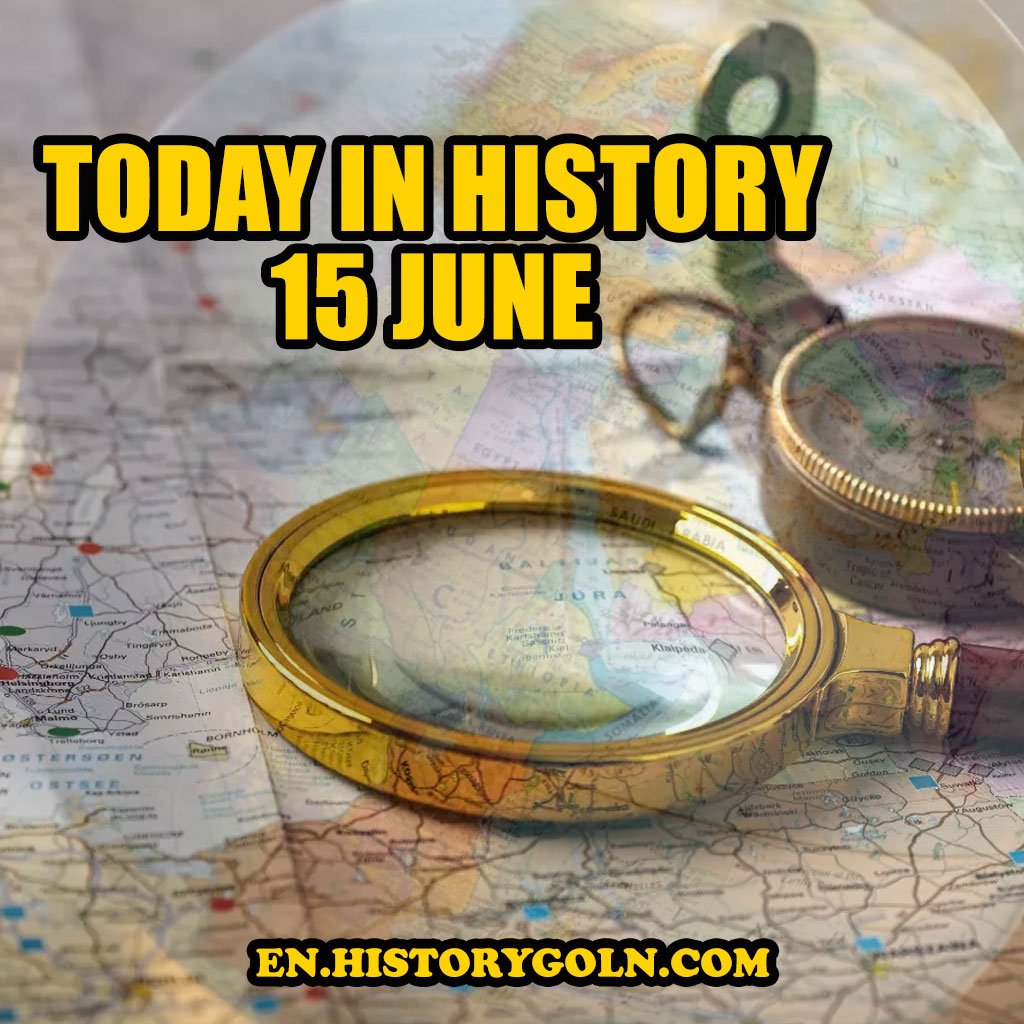June 15 is a day that has witnessed a myriad of critical events, changes, discoveries, and shifts that have indelibly left their mark on the pages of history. Throughout different epochs, this day has been the backdrop for moments that have significantly impacted societies, cultures, and the world at large. Let’s delve into a comprehensive exploration of the significant occurrences on June 15 throughout the ages.
Today in History: 15 June

763 BC – Solar Eclipse in Assyria: Recorded as one of the earliest historical references to a solar eclipse, this event was chronicled by Assyrian observers in the area now known as modern-day Iraq. This account provides crucial chronological markers for historians studying the ancient Near East.
1215 – Magna Carta Signed: Arguably the most celebrated day in June 15’s history is when King John of England sealed the Magna Carta at Runnymede. This seminal document laid the foundation for many fundamental legal concepts, later inspiring numerous constitutional designs, including the U.S. Constitution.
1300 – The Visconti of Milan’s Rule: The Visconti family began its rule over Milan, Italy. Their reign, marked by fluctuating fortunes, would last for almost two centuries and significantly influence the Renaissance’s trajectory in the region.
1389 – Battle of Kosovo: This battle, between the Serbian army and the Ottoman Turks, is a focal point of Serbian nationalism and literature, although its result remains a subject of historical debate.
1520 – Pope Leo X Threatens Martin Luther: Pope Leo X issued the papal bull “Exsurge Domine,” threatening Martin Luther with excommunication unless he recanted his statements against the Catholic Church. This was a pivotal moment in the Protestant Reformation.
1667 – The First Human Blood Transfusion: In France, Jean-Baptiste Denys, the personal physician to King Louis XIV, performed the first documented human blood transfusion. He transfused the blood of a sheep into a 15-year-old boy, a procedure that was both groundbreaking and controversial.
1752 – Benjamin Franklin’s Kite Experiment: Benjamin Franklin supposedly conducted his famous kite experiment, proving that lightning was electricity. This event remains one of the most iconic tales of scientific endeavor.
1775 – Second Continental Congress: George Washington was appointed as commander-in-chief of the Continental Army by the Second Continental Congress during the early days of the American Revolution.
1844 – Charles Goodyear Receives a Patent: Goodyear was awarded a patent for the vulcanization process of rubber. This innovation would drastically change industries, particularly automotive and footwear, making rubber more durable and weather-resistant.
1846 – Oregon Treaty: The Oregon Treaty was signed by the United Kingdom and the United States, establishing the 49th parallel as the primary international boundary between the U.S. and Canada in the west.
1864 – Arlington National Cemetery: The U.S. government established Arlington National Cemetery in Virginia, a final resting place for many U.S. military members and other dignitaries.
1904 – General Slocum Disaster: The steamship General Slocum caught fire in New York’s East River, becoming one of the city’s most significant tragedies before September 11, 2001. Over 1,000 people lost their lives.
1919 – First Nonstop Transatlantic Flight: British aviators John Alcock and Arthur Brown completed the first nonstop transatlantic flight, traveling from Newfoundland to Ireland.
1934 – The U.S. Great Smoky Mountains National Park was Founded: This park, straddling the border between North Carolina and Tennessee, is renowned for its biodiversity, mist-covered mountains, and well-preserved historic buildings.
1978 – King Hussein of Jordan Marries American Lisa Halaby: The Hashemite Kingdom’s leader married Lisa Halaby, who took the name Queen Noor after her conversion to Islam.
1991 – Mount Pinatubo Eruption: In the Philippines, Mount Pinatubo’s violent eruption marked the second-largest volcanic eruption of the 20th century, leading to significant global environmental effects.
1992 – The U.S. and Russia Announce Strategic Arms Reduction: Presidents George H.W. Bush and Boris Yeltsin announced a significant strategic arms reduction treaty, marking the end of the Cold War era.
2002 – Near-Earth Object: A sizable asteroid, named 2002 MN, missed Earth by a mere 75,000 miles, a close distance in astronomical terms, but went undetected until three days after its closest approach.

In Conclusion
The annals of history for June 15 are dotted with transformative events, groundbreaking discoveries, critical decisions, and moments of profound cultural significance. Reflecting on these events serves as a poignant reminder of humanity’s journey – a journey marked by relentless curiosity, the quest for justice, the throes of conflict, and the triumphs of progress. These pivotal moments from different epochs, though distant in time and space, are interconnected threads in the intricate tapestry of our shared human story.

Each year as June 15 unfolds, it not only offers an opportunity to remember and celebrate our past but also to contemplate our present and envision our future. Drawing inspiration from the lessons of history, we can hope to shape a future that mirrors our highest aspirations, values, and ideals.
See more:
